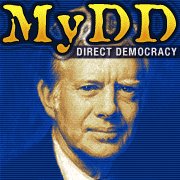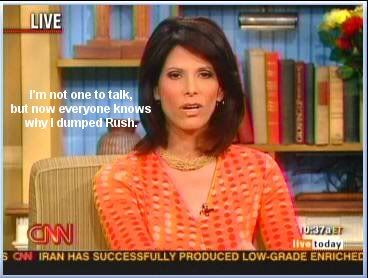Tuesday, June 27, 2006
Monday, June 26, 2006
Rep. King and Sen. McCarthy Launch Joint Congressional Investigation

Senator Joe McCarthy (R-WI), chairman of the Senate Committee on Government Operations and its Senate Permanent Subcommittee on Investigations, and Congressman Peter King (R-NY), chairman of House Homeland Security Committee, announce the formation of their Congressional Joint Committee on Un-American Activities (JUAC).
King stated the first priority for JUAC will be investigating the “arrogant elitist left wing agenda” of the New York Times and wants prosecution for treason (via Think Progress):
"I’m calling on the Attorney General to begin a criminal investigation and prosecution of the New York Times — its reporters, the editors who worked on this, and the publisher. We’re in a time of war, Chris, and what they’ve done has violated the Espionage Act, the COMINT act."
McCarthy was in full agreement saying once the Communists at the New York Times were dealt with the JUAC would then investigate communist infiltrators at the CIA, which have been undermining President Cheney’s war efforts. McCarthy and King said they would also look into the involvement of American soldiers in the 1944 Malmedy massacre of German Waffen-SS prisoners of war with the help of evidence found by journalist Bill O’Reilly.
Sunday, June 25, 2006
Extremes of BushCo: Bank Data Edition Episode II
Previously, I asked, “how long before we discover cooperation by individual financial institutions about transactions on individual accounts -- not just between financial institutions?”
Well, it didn’t take long for an answer. It took less than a day to discover that BushCo has been tracking most, if not all, credit card transactions and all Western Union wires transfers. The story has been largely ignored by the media hidden behind the zeal to portray Democrats as “cut and run” cowards and to promote fear by building up the credibility of a group of misfits and their plot to blow up the Sears Tower.
"First Data Corp., the world's largest processor of credit-card transactions and wire transfers, gave the FBI and CIA unfettered access to data on millions of customers..." (Denver Post, June 21)The latest revelation comes from Ron Suskind’s book, "The One Percent Doctrine", but has been overlooked by major news outlets and I have not seen it discussed in recent interviews with Suskind on news and talk shows for his book tour. The Rocky Mountain News and Denver Post seem to be the only ones that have covered the story. From the Rocky Mountain News article, First Data tied to post-9/11 terror sweep:
In the days after the Sept. 11 terrorist attacks, First Data Corp. and its Western Union unit volunteered itself for the U.S. government's war on terror.The Denver Post article, Book: First Data gave feds records, includes this:FBI agents happily turned the Greenwood Village-based company into a "deadly weapon" to fight terrorism, according to a new book by Pulitzer Prize winner Ron Suskind.
At the same time, however, the Bush administration used First Data to create a "vast search-and-seizure machine" that sifted through millions of Americans' credit-card purchases and wire transfers, unbeknownst to congressional overseers or the secret court designed to rule on matters of domestic surveillance, Suskind reported.
First Data's computer systems served as the "FBI's own in-house search engine," and the CIA was allowed to monitor money-wire transactions in real time, according to "The One Percent Doctrine" by Pulitzer Prize winner Ron Suskind.
Greenwood Village-based First Data and its money-transfer subsidiary Western Union declined to answer questions from The Denver Post but issued a joint statement.
...
The FBI accepted the offer and conducted thousands of financial searches on First Data's computer systems in the weeks after the attacks. The FBI even set up a joint office with First Data near the company's processing center in Omaha.
The FBI cross-checked information with the National Security Agency, which received data on millions of phone customers and calls from the nation's telecommunications companies, Suskind wrote.
Friday, June 23, 2006
No end to the extremes of BushCo: Bank Data Edition
From the New York Times, Bank Data Sifted in Secret by U.S. to Block Terror:
Under a secret Bush administration program initiated weeks after the Sept. 11 attacks, counterterrorism officials have gained access to financial records from a vast international database and examined banking transactions involving thousands of Americans and others in the United States, according to government and industry officials.The program is limited, government officials say, to tracing transactions of people suspected of having ties to Al Qaeda by reviewing records from the nerve center of the global banking industry, a Belgian cooperative that routes about $6 trillion daily between banks, brokerages, stock exchanges and other institutions. The records mostly involve wire transfers and other methods of moving money overseas and into and out of the United States. Most routine financial transactions confined to this country are not in the database.
Don't you feel secure that "government officials" of the Cheney Misadministration say this is limited to people of suspected ties to Al Qaeda just like the NSA spying with the assistance of the telecoms.
The program is grounded in part on the president's emergency economic powers, Mr. Levey said, and multiple safeguards have been imposed to protect against any unwarranted searches of Americans' records.The program, however, is a significant departure from typical practice in how the government acquires Americans' financial records. Treasury officials did not seek individual court-approved warrants or subpoenas to examine specific transactions, instead relying on broad administrative subpoenas for millions of records from the cooperative, known as Swift.
This is another program with no judicial oversight. What you don't about SWIFT? I'm not surprised. I'm familiar with it because of several years of consulting and architecture for secure transactions between financial institutions. This is extraordinary to me!
SWIFT released the following press release (via Los Angeles Times):
SWIFT is the industry-owned cooperative supplying secure, standardised messaging services and interface software to over 7,800 financial institutions worldwide. SWIFT is solely a messaging intermediary for transmitting secure and confidential financial messages between financial institutions. SWIFT is not a bank, nor does it hold accounts of any customers.SWIFT takes its role as a key infrastructure of the international financial system very seriously and cooperates with authorities to prevent illegal uses of the international financial system. Where required, SWIFT has to comply with valid subpoenas. SWIFT's compliance policy is published on http://www.swift.com/.
In the aftermath of the September 11th attacks, SWIFT responded to compulsory subpoenas for limited sets of data from the Office of Foreign Assets Control of the United States Department of the Treasury. Our fundamental principle has been to preserve the confidentiality of our users' data while complying with the lawful obligations in countries where we operate. Striking that balance has guided SWIFT through this process with the United States Department of the Treasury.
SWIFT negotiated with the U.S. Treasury over the scope and oversight of the subpoenas. Through this process, SWIFT received significant protections and assurances as to the purpose, confidentiality, oversight and control of the limited sets of data produced under the subpoenas. Independent audit controls provide additional assurance that these protections are fully complied with.
All of these actions have been undertaken with advice from international and U.S. legal counsel and following our longstanding procedures on compliance, established by our Board.
Well, we know there will be no Congressional oversight on this latest attack against our privacy and civil liberties. So, the question is how long before we discover cooperation by individual financial institutions about transactions on individual accounts -- not just between financial institutions?















